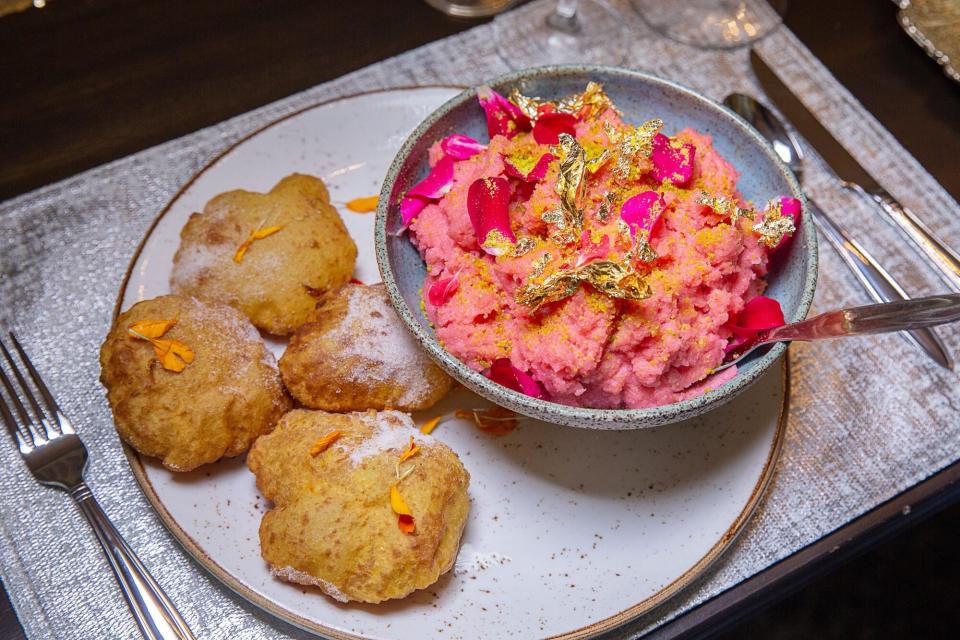Maneet Chauhan's Diwali is Full of Light and Laughter
- Oops!Something went wrong.Please try again later.
When Maneet Chauhan recalls the Diwali celebrations from when she was growing up in Ranchi, in Jharkhand in eastern India, she laughs when she remembers the rush to get ready for the holiday, which is the biggest festival in India.
"There was always a big lead up," she recalls. "My dad had a scooter and we would ride around to find the firecracker shops that were set up a week before. Then we went home and did a big house cleaning, and lit up the whole house with diyas, the candles we set up everywhere. We lived in a small community, so we'd take sweets to our neighbors and visit them; that's a big part of the holiday. A friend would host a Diwali party; a big potluck, with music and fireworks and so much food. All us kids would hang out together and play games, while our parents played Bollywood music and danced."
Not surprisingly, the food figures largely in Chauhan's memories.
"We ate mithais, the sweets that are so important at Diwali, and a big meal. My mother would make goat curry and sweet saffron rice, which I loved," she says. "And then, being a totally obnoxious kid, I would go to our neighbor's houses to see what they were making and taste it."
That love of food pulled Chauhan into a career as a chef, but when she moved to the United States to go to school at the Culinary Institute of America, she lost her connection to the celebration that is so significant to her culture.
"When I first moved to America, I was the only Indian on campus," she recalls. "My sister lived in Chicago, and she would send me care packages, but all I could do for the holiday was reminisce. It inspired me to really do it up when I could."
After stints living and working in New Jersey, Chicago, and New York, she and her husband, Vivek Deora, moved to Nashville. There, raising her daughter, Shagun, and son, Karma, she knew she wanted to create her own Diwali traditions.
"It's interesting how we as people evolve," she notes. "When I first got here, it was important for me to assimilate into American culture. Now, it's a badge of honor and point of pride to say that I am Indian, and these are my traditions."
When I first got here, it was important for me to assimilate into American culture. Now, it's a badge of honor and point of pride to say that I am Indian, and these are my traditions.
—Maneet Chauhan
She and Deora began hosting Diwali parties for their family and friends — Indians and others.
"We eat chaat, there's a mehndi station and a DJ," she explains. "People who aren't Indian get a glimpse of what it's all about, and how much fun it is. These festivals are a way to get everyone together to appreciate each other's traditions. It's important to me that people know about Diwali; it's the biggest holiday of the year for the second-largest population in the world. There are a lot of nuances to it, but you can start by simply getting people together to eat and have fun."
Chauhan's preparations for the holiday start long before the party. She creates rangolis, decorations made with flowers or grains at the entrance to home that serve as a welcoming sign for Lakshmi, the goddess of wealth. She buys new clothes for the family, and she and Deora spend an afternoon cleaning the silver in their house, a traditional pre-Diwali preparation.
"Silver is considered to be a gift from Lakshmi, so we make sure what we have is beautiful for the celebration," she says. "While we clean them, we tell each other stories. Vivek shows me the silver tea set his mom received when she was married. It's a trip down memory lane for us, and a nice way to reconnect."
And, of course, there is food — a lot of food. Chauhan laughs as she acknowledges that she can go overboard ("I have an editing problem!"), and then cheerfully goes all out with her menu.
She starts with Chicken Tikka Masala Samosas, a dish she created for her kids, recalling how much she loved samosas as a child. They also snack on Masala Mixed Nuts seasoned with garam masala, Kashmiri chile powder, and ginger-garlic paste and then fried, another favorite snack from her childhood. At dinner, they move on to Tandoori Pomfret, which was a prized fish for Chauhan and her family in India. She broils it to create some of the effect of a tandoor oven and encourages everyone to eat it with their hands.
At the center of the meal is Laal Maas, a traditional goat curry she and Vivek both grew up eating at Diwali (her recipe is inspired by his mother's version, from Rajasthan in western India). "Goat is my jam; I love it," Chauhan says. She pairs it with a sweet saffron rice for contrast. "It's such an amazing combination of sweet and spicy, gamey and floral from the saffron."
They finish the meal with a dessert of Marigold Pooris with Rose Halwa. The pooris, fried whole wheat flatbreads, are decorated with sugared marigolds, to match the fresh marigolds used as decoration in the house.
Our Diwali is smaller than what you see in India, but it's more meaningful. It's precious to us.
—Maneet Chauhan
And, of course, Chauhan, who has been known to start an impromptu dance party once given control of a portable speaker and a few feet of space, makes sure there is music and dancing.
"I remember when I was a kid, and the dads and moms dancing to Bollywood music while we rolled our eyes at them. Now, I guess we are the parents!"
She laughs, but behind the feast, music, dancing, and laughter is a serious intention, to make sure her children she passes along the connection she feels to the
"Our celebration is my connection to my family in India, and it's also about my life here," she says. "I'm reliving those traditions, and I have the responsibility of passing them on to my children, to show them that this is their heritage. Karma is young; he likes the sparklers and the food. Shagun is getting more and more involved; now, she wants to help me make the rangolis. They both get excited when we light the diyas. We aren't expecting anything from them but to realize the importance of being grateful for the life we have. Everything we do is in part a memory. I'll never be able to recreate the experiences we had growing up — it was a different time and place. But we can create something new that is our own. Our Diwali is smaller than what you see in India, but it's more meaningful. It's precious to us."
Chicken Tikka Masala Samosas
Maneet Chauhan created these Chicken Tikka Masala Samosas for her son, Karma, as part of her family's Diwali celebration. The ginger-garlic paste, tandoori masala, and garam masala spice blends give the chicken a lot of flavor, while the creamy tomato sauce adds richness. These samosas are large, so feel free to cut them into smaller pieces if you prefer.
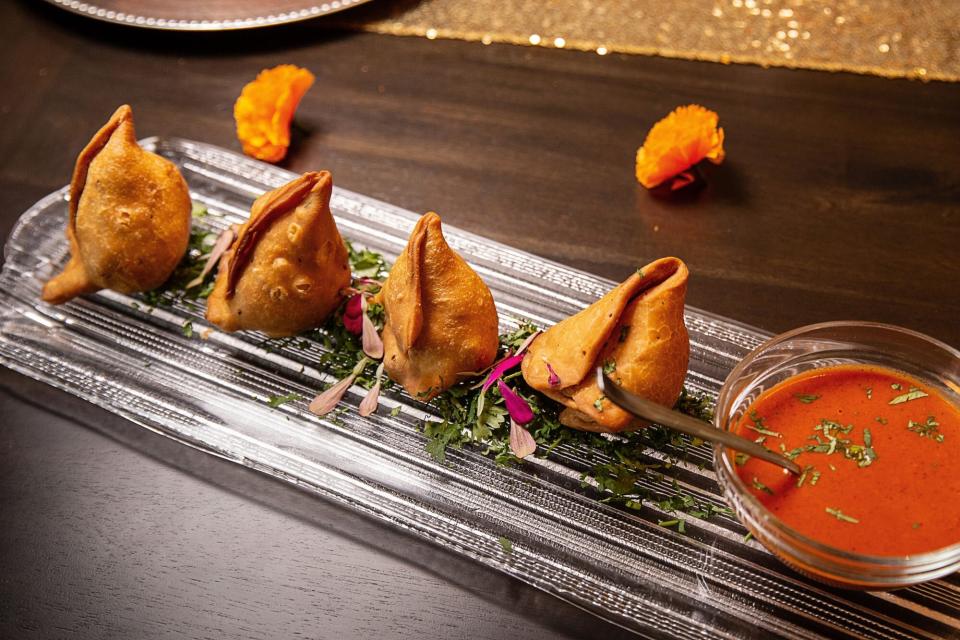
Masala Mixed Nuts
These fried peanuts, cashews, almonds, and walnuts are seasoned with a mix of spices, including mild Kashmiri chile powder and garam masala.
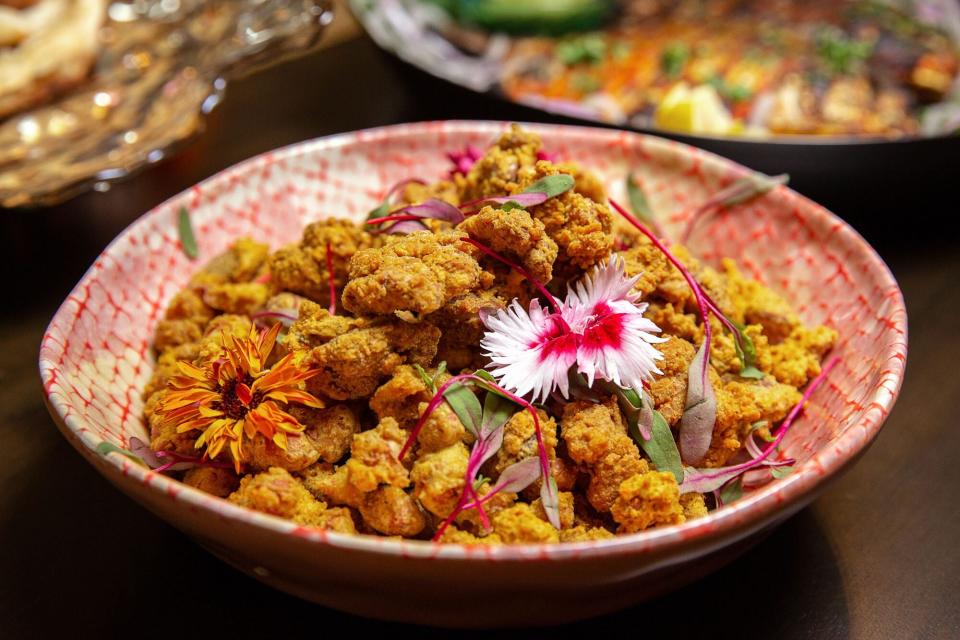
Laal Maas (Rajasthani Goat Curry) with Sweet Saffron Zarda Pulao
Spicy goat curry meets sweet saffron rice in this holiday meal.
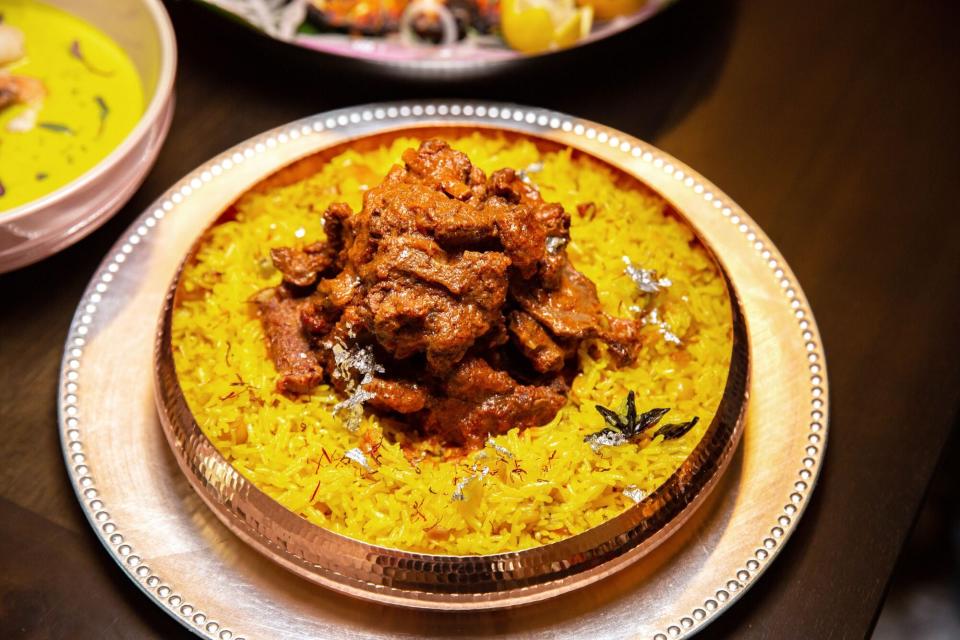
Tandoori Pomfret
Pomfret or another light, flaky fish is seasoned with a spice-rice yogurt marinade and then broiled for a quick and flavorful supper.
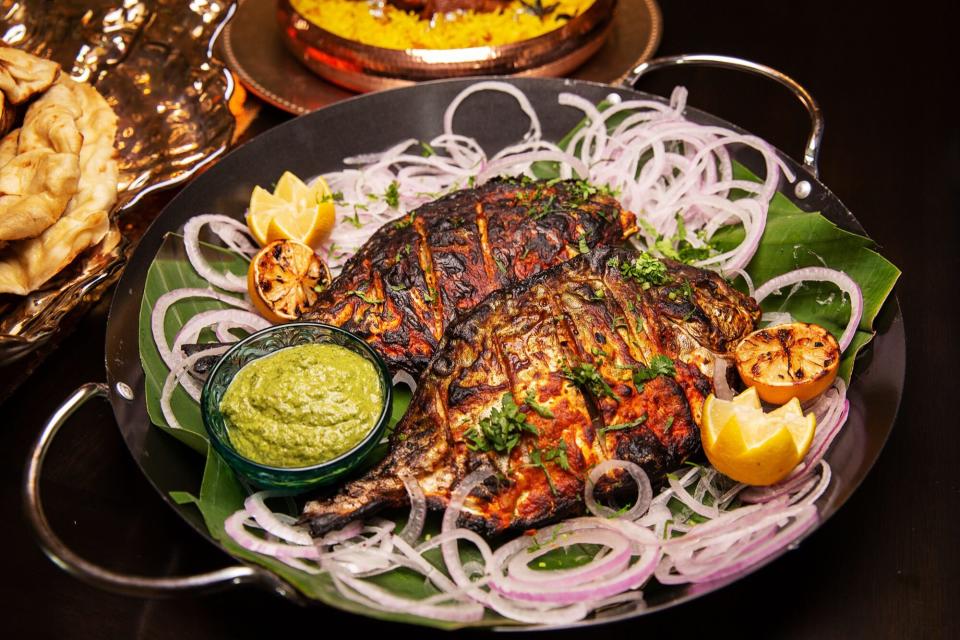
Marigold Pooris and Rose Halwa
This dessert recipe features a rose-scented pudding and pooris accented with sugared marigolds.
